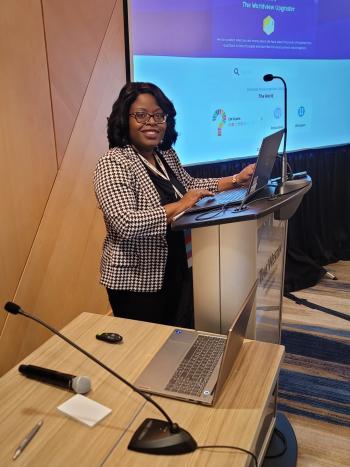How a ChattState Professor is Redefining Support in Online Learning with Embedded Tutors
April 22, 2024 | Payton Potter | Faculty Spotlight

CHATTANOOGA, TN – One Chattanooga State Community College mathematics professor is working hard to ensure her students are well-equipped to succeed both in the traditional classroom and in online classes by incorporating embedded tutors in her courses. Now, she’s working to spread her message of success across the ChattState campus and beyond.
April Crenshaw, Associate Professor of Mathematics at ChattState, is an award-winning educator. Last month, she was named a finalist in three Pearson Excellence in Higher Education Awards: Championing Student Success, Exemplary Teaching and Learning, and Fostering Inclusivity.
Ultimately, Crenshaw was awarded the Pearson Exemplary Teaching and Learning Award. She also received the American Mathematical Association of Two-Year Colleges (AMATYC) Teaching Excellence Award in November 2023.
Crenshaw penned and published an article in National Institute for Staff and Organizational Development (NISOD)’s Innovation Abstracts titled “Redefining Support in Online Learning: The Benefits of Embedded Learning Assistants,” in which she describes the steps she takes to ensure student success.
In her abstract, Crenshaw describes the many academic resources available to ChattState students, including faculty office hours, the Mathematics Center, and free online resources. Still, she wrote, “students who need assistance the most rarely use them.”
As she turned to the literature for answers to understand and mitigate this ‘help-seeking dilemma,’ Crenshaw discovered that several factors including age, sex, attitude towards mathematics, and professorial concern influenced students’ help-seeking behavior. Additionally, busy schedules and social stigma around asking for help may also prevent students from seeking tutoring, she found.
Crenshaw decided, “If I can’t get the students to go to the help, one of the things I can try is to bring the help to the student,” So, she began using Embedded Learning Assistants in her courses.
Simply put, embedded learning assistants are tutors who attend classes and help professors and students by answering questions, helping during group work, and offering additional review sessions outside of class.
While embedded learning assistants have been used for in-person classes at ChattState for some time, Crenshaw pioneered the use of these helpers in online classes after noticing online mathematics students consistently underperformed compared to their in-person peers.
Mathematics Department Head James McCoy congratulated Crenshaw, saying, "April has been a persistent advocate for students, and not just those in her classes, but all students across campus. She is always willing to share with other faculty what is working for her, and just as importantly what is not. I sincerely appreciate how she supports students by also supporting her colleagues. Her use of embedded tutors is a practice that has been adopted by many in our department."
For Crenshaw’s online students, embedded learning helps students via discussion forums, text, and email. These helpers also offer one-on-one live and virtual tutoring sessions at times that are complementary to Crenshaw’s designated student support hours (office hours).
Crenshaw has provided embedded learning assistants in her online mathematics classes for the past three semesters. She said she is tracking factors like student feedback, success rates, and the number of students making tutoring appointments to determine the impact of the program.
“Online students now feel like they have an additional point of contact, particularly those students who don’t have regular face time with an instructor,” she said. “Embedded learning assistants give them someone else to reach out to for help outside of me.”
Crenshaw is dedicated to facilitating student access to support, emphasizing that a key determinant of student success is their willingness to seek help when necessary. “I consistently promote academic help-seeking to my students. I tell them tutoring should be a regular part of their routine in a college course,” she said. “It is just as regular a part of the course as doing homework. However, I realize that getting them there starts with fostering a sense of belonging and building a connection with students. I try to create that with students and hope they can develop that with the embedded assistant who is often their peer.”
While Crenshaw does not yet have enough data to claim that Embedded Learning Assistants are the key to solving the help-seeking dilemma for online mathematics students, she does believe that providing additional support for students is a step in the right direction.
